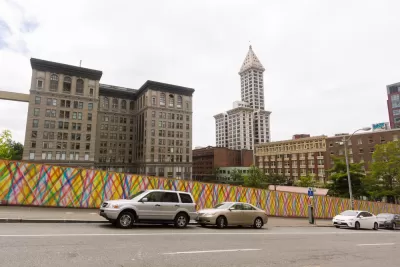The U.S. city with the best recent history of convincing commuters to ditch the auto commute is taking further steps to make the city a little less car-centric.

"Seattle council members on Monday approved changes to the parking code that they hope will ultimately tackle their carbon-free, pedestrian-and-bike-friendly, affordable vision for the city," reports Hayat Norimine.
Specifically, the city's new parking ordinance, "expands areas that fall under the definition of 'frequent transit service,' reduces the parking minimum for affordable housing projects, increases requirements for bicycle parking, allows underused private parking lots to be open to the public, and separates parking fees from rental leases."
Support for the new parking ordinance focused on the potential benefit to housing costs, not the potential environmental benefits of less driving.
A previous article by Norimine provides more explanation and background on the changes to Seattle's parking requirements.
FULL STORY: Seattle City Council Approves Changes to Reduce Parking Requirements

Planetizen Federal Action Tracker
A weekly monitor of how Trump’s orders and actions are impacting planners and planning in America.

Restaurant Patios Were a Pandemic Win — Why Were They so Hard to Keep?
Social distancing requirements and changes in travel patterns prompted cities to pilot new uses for street and sidewalk space. Then it got complicated.

Map: Where Senate Republicans Want to Sell Your Public Lands
For public land advocates, the Senate Republicans’ proposal to sell millions of acres of public land in the West is “the biggest fight of their careers.”

Maui's Vacation Rental Debate Turns Ugly
Verbal attacks, misinformation campaigns and fistfights plague a high-stakes debate to convert thousands of vacation rentals into long-term housing.

San Francisco Suspends Traffic Calming Amidst Record Deaths
Citing “a challenging fiscal landscape,” the city will cease the program on the heels of 42 traffic deaths, including 24 pedestrians.

California Homeless Arrests, Citations Spike After Ruling
An investigation reveals that anti-homeless actions increased up to 500% after Grants Pass v. Johnson — even in cities claiming no policy change.
Urban Design for Planners 1: Software Tools
This six-course series explores essential urban design concepts using open source software and equips planners with the tools they need to participate fully in the urban design process.
Planning for Universal Design
Learn the tools for implementing Universal Design in planning regulations.
Heyer Gruel & Associates PA
JM Goldson LLC
Custer County Colorado
City of Camden Redevelopment Agency
City of Astoria
Transportation Research & Education Center (TREC) at Portland State University
Camden Redevelopment Agency
City of Claremont
Municipality of Princeton (NJ)





























